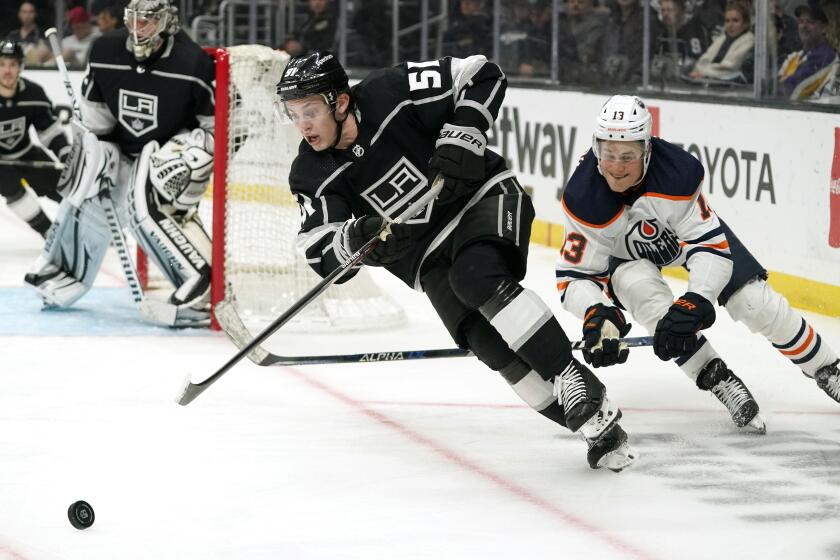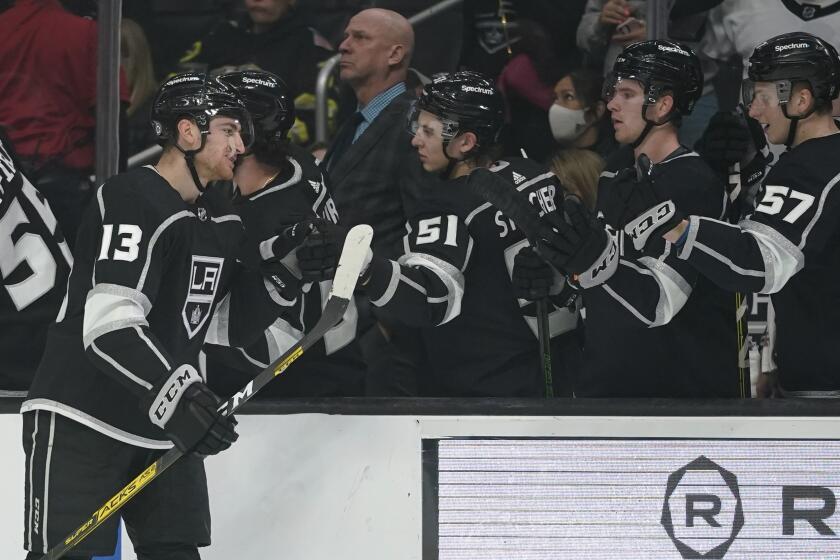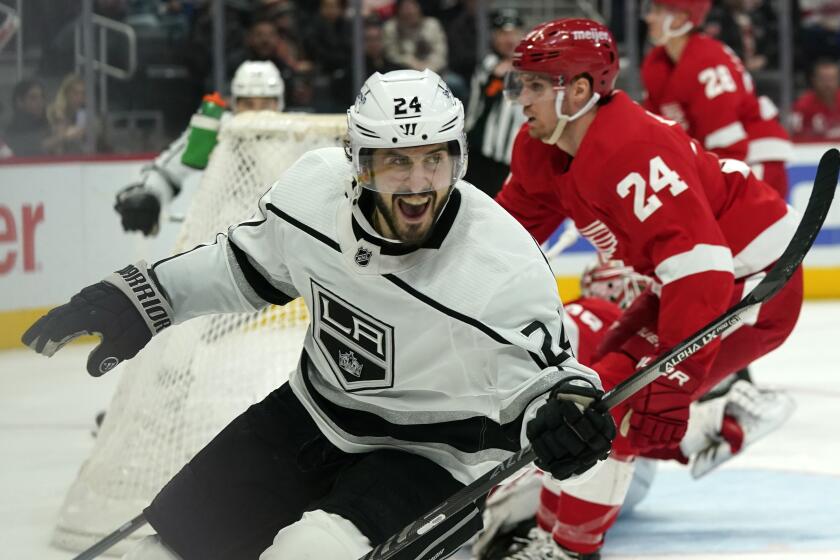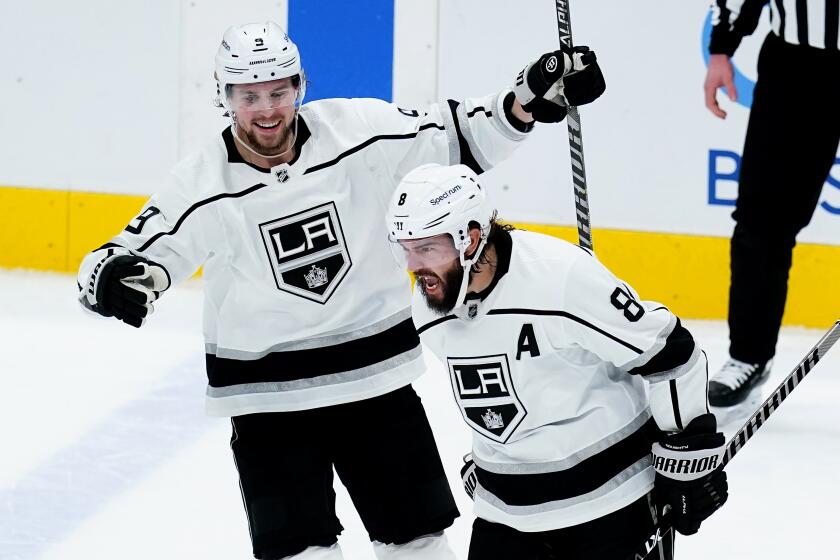Kings roundtable: Is there a Stanley Cup path for the revived NHL franchise?

April 10 marks the 40th anniversary of the Miracle on Manchester, when the Kings overcame a 5-0 deficit to stun the Edmonton Oilers in Game 3 of the opening round of the 1981-82 NHL playoffs. Los Angeles, which finished the regular season 48 points behind the Wayne Gretzky-led Oilers, would go on to pull off the series upset. Ahead of a likely renewal of that postseason rivalry at the end of this month, The Times hosted a playoff preview roundtable at Crypto.com Arena on Thursday, before the Oilers’ 3-2 victory over the Kings — and on the 40th anniversary of another epic: the Kings’ Game 1 scorigamic 10-8 shocker over heavily favored Edmonton.
Moderated by Times executive Sports editor Chris Stone, the panel was joined by Times columnist Helene Elliott, assistant sports editor Hans Tesselaar and Kings insiders Jesse Cohen and Zach Dooley. The following is an excerpt from the 45-minute conversation, which has been lightly edited for clarity.
Chris Stone: Let’s assume that Kings-Oilers is the matchup in the first round. How do these two teams match up?
Zach Dooley: When these two teams played last week in Edmonton [a 4-3 Oilers shootout win on March 30], it was the perfect microcosm of Kings-Oilers. The first half of that game was controlled by the Oilers. They had speed, skill, more offensive opportunities, and that’s how they like to play. They’re free-flowing. They have two of the top five players in the NHL, [Connor] McDavid and [Leon] Draisaitl. Those guys controlled that game, but the Kings weathered the storm. They fought back in the second period and from that point on, the Kings played to their identity, which is to control the puck. Puck possession, volume shooting, second chances, third chances.
You saw both identities. When the Kings play their style of hockey, when the Oilers play their style of hockey, both teams can impose their game on the other. Neither team is necessarily better than the other, and I thought that game last week was a perfect preview.
The Kings would meet the Edmonton Oilers in the playoffs if the NHL standings remain the same. Their loss Thursday indicates they must improve.
Stone: Zach referenced team identity, a really interesting theme. Hans, what is the identity of this particular Kings’ team?
Hans Tesselaar: I think what we’re seeing with this Kings team is a heart and passion that hasn’t been seen in a long time. They’re not the most talented team in the league, but this team works its tail off. It’s been a long rebuild and it appears to be a success right now.
I think that effort is really appreciated because the last few years it didn’t feel that way. It’s the first time since 2018 that the games are important this time of the season. No one thinks they’re going to win the Cup this year, but any experience they get this year is going to be great for down the road.
Stone: Jesse, earlier today, offline, we were talking about [team President] Rob Blake and what he inherited, which was not much. Frankly, a little bit of a mess. Discuss the evolution of the team’s identity under Rob.
Jesse Cohen: The best of teams in the best of circumstances have to deal with the passing of time, whether it’s the Oilers dynasty, the Canadiens dynasty. Times change, players age out, you have to adjust to that reality. When Rob Blake took over this team, his first move was acquiring Cal Petersen. That was when the window of Cup contention arguably was still open.
But every move that he made when he took over, even if it was to address the present, was done with an eye towards the future. That to me is how you execute a successful … I don’t even like the word rebuild, but if we’re going to use the term, that’s how you do it. You always have an eye towards the future because no matter how much success or failure you have in the present, there’s always a next season. There’s always a season after that. So whether it’s acquiring Cal Petersen, whether it’s signing Alex Iafallo, Sean Walker, making trades to get Trevor Moore, all the other players, Sean Durzi, Carl Grundstrom that have come in. We’re now seeing five years later, in some cases, the payoff for that strategy of always looking towards the future.
The youth movement on the Kings is finally maturing and finding ways to win games as the team embraces a playoff mind-set over the final 15 games.
Stone: Helene, your own interpretation of the Blake years and the identity the franchise has carved.
Helene Elliott: Everybody loved the two Cup teams, but I think that Dean Lombardi tried to keep it together too long. I think that the style of play in the NHL was changing away from the heavy hockey that those 2012 and ’14 teams played and it was going more towards youth and speed. Dean tried to keep the dynasty going at the expense of draft picks and at the expense of the long-term future. That, of course, is what Rob had to reverse right away. He had to find the youth, find the speed and it takes a while to develop. Not every draft pick is going to turn out right. Not every college free agent signing is going to turn out right.
Last summer, they were not going to sign a $12 million on a free agent. They weren’t ready for that. It wasn’t going to help them win the Cup. But those guys they did sign — Philip Danault, Viktor Arvidsson, Alexander Edler — brought the veteran presence. Those guys brought the stability, the knowledge, the experience that they’re giving to the younger kids, and that will pay off. The next step maybe over this summer, you make a trade, a really high-impact trade, or a high-impact free-agent signing. Doing it last summer wouldn’t have made sense. Doing it this summer makes an awful lot of sense.
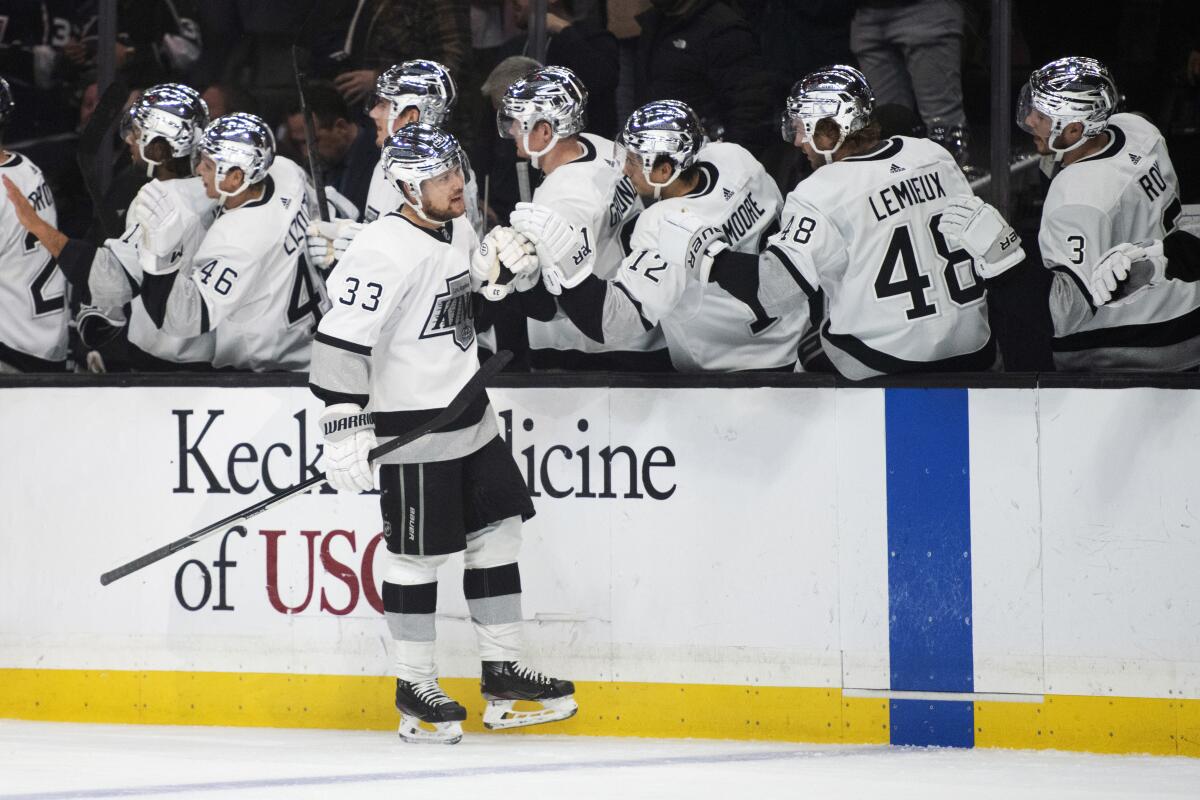
Stone: Let’s have some fun with what you said before about the Kings positioning themselves to go get somebody in this summer’s free-agent market. Who is the ideal free agent?
Tesselaar: Filip Forsberg.
Stone: Helene, who should they be going after, if not a specific name, a type of player?
Elliott: I would like to see a No. 1 left wing who scores more than Alex Iafallo does. I love Iafallo, but if you’re going to be a top-line left wing, you’ve got to be producing.
Cohen: I’m going to take a very unpopular opinion. I think one of the reasons that you focus on a rebuild, the way that the Kings have is to bring and develop the young talent. They’ve focused on acquiring all of these high-profile drafts picks. One of the arguments that I frequently find myself having is whether or not the Kings have a strong track record of developing forward prospects at all. We know their record with goaltenders and defensemen. One of the arguments I’ve always made is over the last 10 years, whether it was Anze Kopitar, Jeff Carter, Tyler Toffoli, Tanner Pearson, Dustin Brown, Justin Williams. . . You all know the names, there wasn’t any room for the Jordan Weals or any of the young prospects to take those spots and to become the players that [fans] want them to be.
Phillip Danault knew there was more to his game than being a defensive star and the Kings agreed. In his first season in L.A., he has set a career high in goals.
If you want Artie Kaliyev to become a 30-goal scorer, you have to give him the minutes to score those goals. Signing Filip Forsberg is just trading the last four years of high draft picks to put [the franchise] right back in the situation it was in three years ago, when it had a bunch of high-profile, high-contract veterans that limited the team’s flexibility. I’d rather see them retain that flexibility while giving those young players an opportunity.
Having said that, if they sign a big-profile player, I will buy into it in about 30 seconds.
Dooley: The ultimate thing that I think is important here is that the Kings have set themselves up with prospects, cap space and draft picks to do whatever they want in the offseason. They have a prospect pool and a collection of assets that could pretty much allow them to make whatever move they decide is right.
Stone: One thing that’s so wonderful about hockey is once you get to the postseason, most of these teams have a shot. You wouldn’t be surprised if they pulled off what the Kings did in 2012, when they were an eight seed. Or ’14 when they finished third in the Pacific, which is exactly where they find themselves right now. You can dream in the NHL. Along those lines, what is the Kings’ path to the Cup?
Dooley: The path to the Cup likely means beating Edmonton and Calgary. The Kings have shown this year that they’re going to play one-goal games with Edmonton and Calgary. They’ve played the Flames three times this year. All three games were Darryl Sutter-special 3-2 games. They played the Edmonton Oilers to an overtime game and they played them to a couple games that were one-goal games late in the third period, but expanded late with power-play goals or empty-netters.
The Kings have played one-goal hockey for the majority of this season. If you look at their goal differential, they’re plus-two on the year. The Kings aren’t beating teams by four or five goals. They’re winning one-goal games and it’s the experience in those one-goal games that’s going to need to carry them in the postseason.
Cohen: It starts at the net. I don’t think it’s a surprise to anybody that strong goaltending defines playoff runs. I don’t know that there’s ever been a team that’s won a Cup exclusively on the strength of goaltending alone, but certainly a number of teams have found themselves in the finals based on goaltending. I’m a firm believer in the idea that if you have two goalies, you have none. I know Todd McLellan would disagree with me on that front, but I think the path to playoff success for this Kings team is finding one goalie to start in the playoffs.
The Kings’ rebuilding plan is paying off this season with a long-awaited potential berth in the NHL playoffs. Their veteran core has paved the way.
Stone: Helene, I will frame the question to you in a slightly different way. Is there a path?
Elliott: There’s absolutely a path. I mean, as you brought up a little bit ago, the Kings were an eight seed in 2012 and nobody really expected much of them and then they blitzed everybody. There is a path as long as everybody is healthy, as long as everybody is playing as a unit, as long as there’s leadership in the locker room. I think we all know that there is. There’s solid leadership. As long as the kids are able to learn and able to recover from mistakes. They’re going to make mistakes. It’s how you get back up after you fall that matters. Absolutely, there’s a path.
I think Colorado, obviously, is the class of the league, no question. I think Calgary has been a little bit of a surprise, too, and we know that Darryl Sutter knows how to win in the playoffs, knows how to coach playoff hockey. There are any number of possibilities. That’s what makes the Stanley Cup playoffs the best playoffs in any sport.
Tesselaar: I firmly believe the path for the Kings is maybe 2023. When the Kings won the Cup in 2012, they had been to the playoffs, in 2010, when they lost to Vancouver in the first round. In 2011 they lost in six games to the Sharks. So that [Cup-winning] team in 2012 had playoff experience. Outside of the core four on this team, there’s not a lot of playoff experience. You’ve got Arvidsson and Danault being in the Stanley Cup finals last year. But I think it might be too much to ask for this younger group to pull it off this year. I think the experience, though, can only help this team moving forward.
More to Read
Go beyond the scoreboard
Get the latest on L.A.'s teams in the daily Sports Report newsletter.
You may occasionally receive promotional content from the Los Angeles Times.
